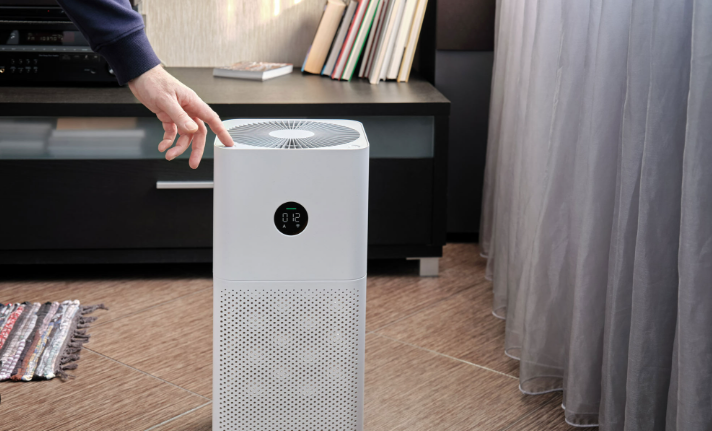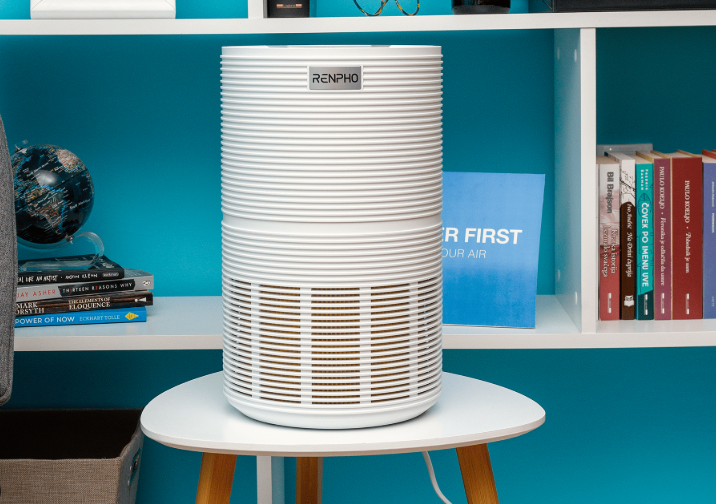In 2025, the question “Can you sleep with an air purifier on?” is common among those seeking cleaner air and better sleep quality. Air purifiers can significantly improve indoor air by removing allergens, dust, pet dander, and smoke, creating a healthier sleep environment. Running an air purifier overnight is not only safe but also beneficial, especially for allergy sufferers or those with respiratory issues. This comprehensive guide answers “Can you sleep with an air purifier on?” while reviewing top air purifiers designed for quiet, nighttime use. We’ll cover air purifier setup, how to use an air purifier, air purifier maintenance, and air purifier safety tips. Whether you need a portable air purifier or a unit for larger bedrooms, our best air purifier guide will help you choose the right model. For more insights, explore this clean air guide.
Can You Sleep with an Air Purifier On? The Benefits and Considerations
Yes, you can safely sleep with an air purifier on, and doing so offers numerous benefits. Indoor air often contains pollutants like dust mites, pollen, pet dander, and volatile organic compounds (VOCs), which can disrupt sleep by triggering allergies or asthma. According to the EPA, air purifiers with True HEPA filters can remove 99.97% of particles as small as 0.3 microns, improving air quality and promoting restful sleep. Running an air purifier overnight helps maintain consistent air quality, reduces nighttime sneezing or congestion, and creates a cleaner bedroom environment.
However, to sleep comfortably with an air purifier on, choose a model with quiet operation (under 25 dB in sleep mode), dimmable or no lights, and ozone-free filtration. Some units offer sleep modes or smart features to optimize performance at night. Below, we review the best air purifiers for nighttime use in 2025, ensuring quiet, effective operation for undisturbed sleep.
Top Air Purifiers for Sleeping in 2025
Here are the top rated air purifiers for sleeping, selected for their ultra-quiet operation, effective filtration, and bedroom-friendly features, based on expert testing and user feedback.
1. Levoit Core 300S Smart Air Purifier – Best Overall for Nighttime Use
The Levoit Core 300S is the best air purifier for sleeping due to its whisper-quiet sleep mode and smart features, ideal for bedrooms up to 219 square feet. It effectively removes allergens, dust, and pet dander, ensuring clean air all night.
Key Features:
- Three-stage filtration: washable pre-filter, H13 True HEPA, activated carbon
- CADR: 141 CFM (dust, smoke, pollen)
- Ultra-quiet at 22 dB in sleep mode
- Energy Star certified, using 8-23 watts
- VeSync app for scheduling, dimmable display, and voice control (Alexa, Google Assistant)
Air Purifier Setup: Place the Core 300S on a nightstand or floor with 10-15 inches of clearance. Remove the filter’s plastic wrap and connect to the VeSync app to enable sleep mode, which dims the display and minimizes noise.
Air Purifier Maintenance: Wash the pre-filter every 2-4 weeks to trap dust and hair. Replace the HEPA and carbon filters every 6-8 months ($29.99). The app provides filter-life alerts, simplifying air purifier maintenance.
Why It Stands Out: It improves air quality by 93% in 60 minutes in a 219-square-foot room, with a sleep mode quieter than a whisper. The Spruce and Forbes Vetted praise its quiet performance and smart controls for nighttime use at $149.99.
2. Blueair Blue Pure Mini Max – Best for Small Bedrooms
The Blueair Blue Pure Mini Max is a top choice in best air purifier for sleeping reviews for small bedrooms up to 186 square feet, offering HEPASilent™ technology and ultra-quiet operation.
Key Features:
- Three-stage filtration: washable fabric pre-filter, HEPASilent, activated carbon
- CADR: 75 CFM (dust, smoke, pollen)
- Quiet at 18-46 dB with Night mode
- Energy-efficient at 10-20 watts
- Compact design (10.6 x 6.9 inches, 2.7 lbs)
How to Use an Air Purifier: Place on a nightstand with 10 inches of clearance. Select Night mode via the single-button control to minimize noise and turn off lights for undisturbed sleep.
Air Purifier Cleaning: Wash the pre-filter every 2-4 weeks with water or a vacuum. Replace the main filter every 6-9 months ($29.99).
Why It Stands Out: It clears allergens in 30 minutes in a 186-square-foot room, with a sleep-friendly design. Forbes Vetted praises its portability and quiet operation at $99.99.

3. Coway Airmega 150 – Best for Allergy Sufferers
The Coway Airmega 150 is a top performer in best air purifier for sleeping reviews for bedrooms up to 214 square feet, with quiet operation and effective allergen removal.
Key Features:
- Three-stage filtration: washable pre-filter, True HEPA, activated carbon
- CADR: 153 CFM (smoke), 161 CFM (dust), 171 CFM (pollen)
- Quiet at 20-39 dB with sleep mode
- Energy Star certified, using 35 watts
- Color-coded air quality indicator
Air Purifier Setup: Place centrally with 10-15 inches of clearance. Enable sleep mode to dim lights and reduce noise, ideal for nighttime use.
Air Purifier Maintenance: Wash the pre-filter every 2-4 weeks. Replace the HEPA and carbon filters annually ($49).
Why It Stands Out: It reduces allergens by 90% in 30 minutes, with a sleep mode quieter than a library. Consumer Reports praises its effectiveness and low noise at $189.99.
4. Dyson Purifier Cool TP07 – Best for Smart Nighttime Use
The Dyson Purifier Cool TP07 is a premium best air purifier for sleeping for bedrooms up to 400 square feet, combining purification with cooling and smart features for a comfortable sleep environment.
Key Features:
- Two-stage filtration: HEPA H13, activated carbon
- CADR: Not listed, but effective for medium rooms
- Quiet at 40-50 dB with night mode
- MyDyson app for air quality monitoring and dimmable display
- 350-degree oscillation for cooling
How to Use an Air Purifier: Place centrally with 10 inches of clearance. Use the MyDyson app to enable night mode, which dims the display and reduces noise, and adjust cooling for sleep comfort.
Air Purifier Maintenance: Replace the HEPA filter annually ($79.99). Clean the exterior monthly with a soft cloth.
Why It Stands Out: It clears allergens rapidly, with a fan feature for warm nights. PCMag praises its smart controls and quiet operation at $549.99, though filter costs are high.
5. Levoit Core 200S – Best Budget Option for Sleeping
The Levoit Core 200S is a budget-friendly best air purifier for sleeping for rooms up to 183 square feet, offering smart features and ultra-quiet operation for small bedrooms.
Key Features:
- Three-stage filtration: washable pre-filter, True HEPA, activated carbon
- CADR: 118 CFM (dust, smoke, pollen)
- Quiet at 24 dB in sleep mode
- Energy-efficient at 37 watts
- VeSync app with dimmable night light
Air Purifier Setup: Place on a nightstand with 10 inches of clearance. Connect to the VeSync app to enable sleep mode and control the night light for a restful environment.
Air Purifier Troubleshooting: If performance drops, check for clogged filters or improper placement. Reset the app if connectivity fails.
Why It Stands Out: It improves air quality by 93% in 60 minutes in a 183-square-foot room, with a budget-friendly price of $89.99. AirPurifierFirst.com praises its quiet operation and smart features.

Can You Sleep with an Air Purifier On? Key Benefits
Sleeping with an air purifier on offers several advantages:
- Improved Air Quality: Removes allergens like dust mites, pollen, and pet dander, reducing nighttime sneezing or congestion.
- Better Sleep: Cleaner air promotes deeper, uninterrupted sleep, especially for those with allergies or asthma.
- Quiet Operation: Models with sleep modes (e.g., Levoit Core 300S at 22 dB) ensure minimal noise disruption.
- Health Benefits: Reduces exposure to pollutants, supporting respiratory health and overall well-being.
Considerations for Sleeping with an Air Purifier On
To ensure a restful night, keep these factors in mind:
- Noise Levels: Choose purifiers with sleep modes under 25 dB, like the Blueair Mini Max (18 dB) or Coway Airmega 150 (20 dB).
- Light Control: Opt for models with dimmable or no lights (e.g., Dyson TP07’s night mode) to avoid sleep disruption.
- Ozone Safety: Avoid purifiers with non-disableable ionizers, as ozone can irritate lungs. All listed models are CARB-certified.
- Room Size: Match the purifier’s CADR to your bedroom size for optimal performance.
How to Choose the Best Air Purifier for Sleeping in 2025
Selecting the best air purifier for sleeping depends on your bedroom size and preferences. Consider these factors:
- Room Size: Match the CADR to your bedroom’s square footage (e.g., 141 CFM for a 219 sq. ft. room). The Dyson TP07 suits larger bedrooms (400 sq. ft.), while the Levoit Core 200S is ideal for smaller spaces (183 sq. ft.).
- Filtration Type: Choose True HEPA (H13 or higher) for allergens and activated carbon for light odors. Avoid ionizers unless they can be disabled.
- Noise Level: Prioritize models under 25 dB, like the Levoit Core 300S (22 dB) or Blueair Mini Max (18 dB).
- Light Control: Select units with dimmable displays or sleep modes to avoid light disturbance.
- Energy Efficiency: Look for Energy Star-certified models to reduce electricity costs.
- Maintenance Costs: Washable pre-filters (Levoit, Blueair, Coway) save money. Check filter replacement costs ($29.99-$79.99).
For more guidance, visit this air purifier resource.
Air Purifier Tips for Optimal Nighttime Performance
Maximize your best air purifier for sleeping with these air purifier tips:
- Placement: Position on a nightstand or floor with 10-15 inches of clearance, near allergen sources like pet beds. Avoid direct airflow to your face.
- Continuous Operation: Run 24/7 on sleep or auto mode for consistent air quality, especially during allergy seasons.
- Regular Cleaning: Wash pre-filters every 2-4 weeks to trap dust and hair. Replace HEPA/carbon filters every 6-12 months. See filter maintenance tips.
- Light and Noise Management: Use sleep mode to dim lights and reduce noise. Ensure the unit is on a stable surface to avoid vibrations.
- Complementary Cleaning: Vacuum with a HEPA-filtered vacuum to remove settled allergens, enhancing purifier efficiency.
Air Purifier Safety Considerations
Prioritize air purifier safety when sleeping with an air purifier on:
- Choose CARB-certified models (all listed models comply) to ensure ozone levels are below 0.05 ppm for safe nighttime use.
- Keep units away from water or high-humidity areas to prevent electrical issues.
- Follow manufacturer instructions for filter cleaning and replacement.
- Ensure proper ventilation to avoid overheating, especially in small bedrooms.
Air Purifier Troubleshooting Common Issues
Encountering issues with your best air purifier for sleeping? Try these solutions:
- Reduced Performance: Check for clogged pre-filters or main filters. Clean or replace as needed.
- Excessive Noise: Place on a flat surface and use sleep mode for quieter operation.
- App Connectivity Issues: Reset Wi-Fi or restart the app for smart models like the Levoit Core 300S.
- Light Disturbance: Enable sleep mode or cover the display to eliminate light output.
Conclusion: The Best Air Purifiers for Sleeping in 2025
Answering “Can you sleep with an air purifier on?“—yes, it’s safe and highly beneficial when using a quiet, ozone-free model. The Levoit Core 300S is the best air purifier for sleeping with its smart features and ultra-quiet operation, while the Blueair Blue Pure Mini Max excels in small bedrooms. The Coway Airmega 150 is ideal for allergy sufferers, the Dyson Purifier Cool TP07 offers premium smart features, and the Levoit Core 200S provides budget-friendly performance. By following proper air purifier setup, air purifier cleaning, and air purifier maintenance practices, you can enjoy cleaner air and better sleep. For more tips, explore this clean air guide. Invest in the best air purifier for sleeping today for a healthier, more restful 2025!